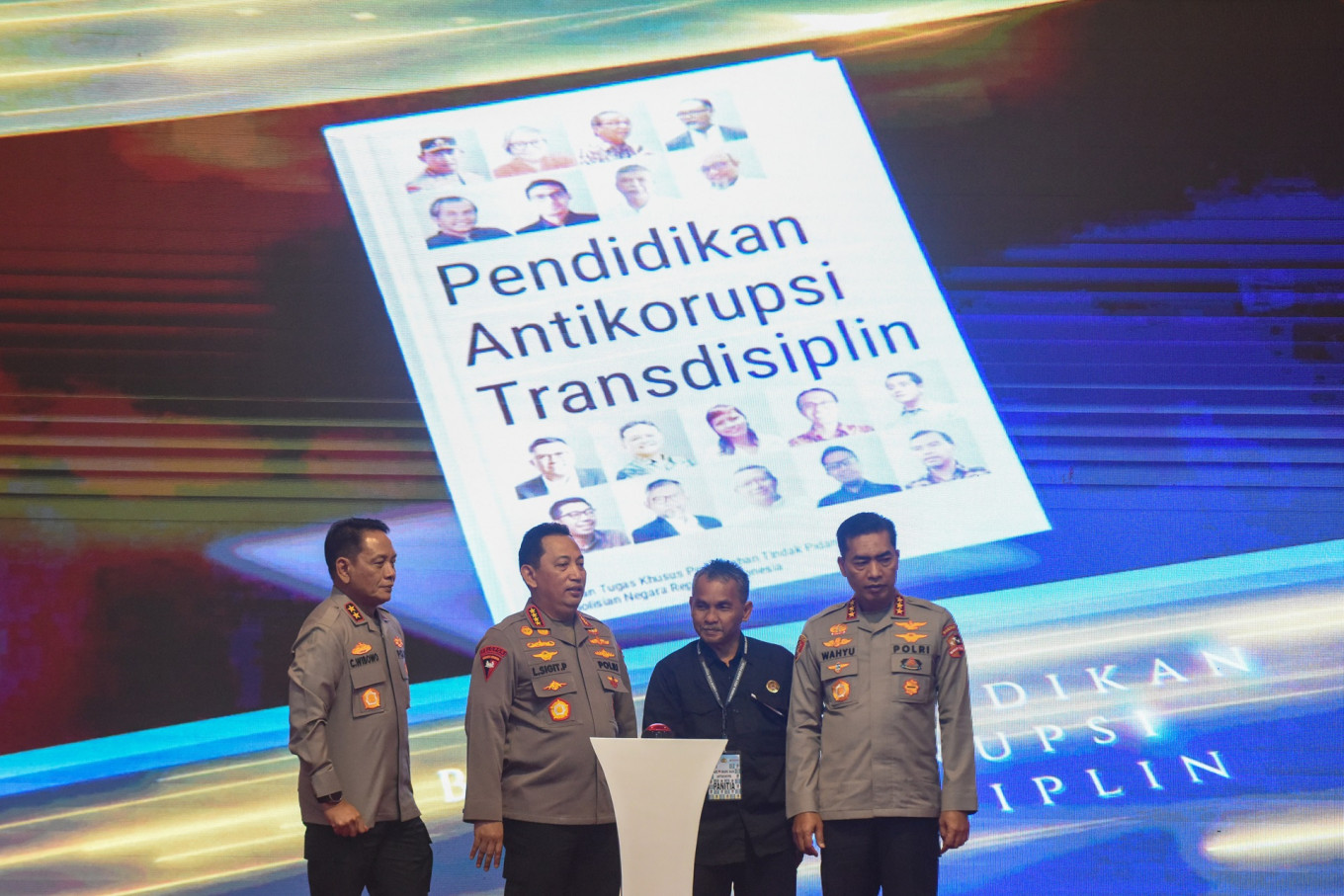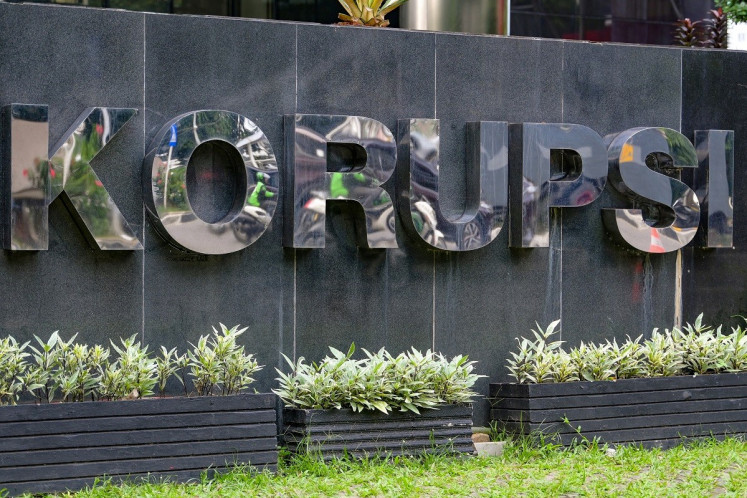Popular Reads
Top Results
Can't find what you're looking for?
View all search resultsPopular Reads
Top Results
Can't find what you're looking for?
View all search resultsCompeting antigraft campaigns
A new police corps may create overlapping roles among existing institutions in investigating corruption cases.
Change text size
Gift Premium Articles
to Anyone
 National Police chief Gen. Listyo Sigit Prabowo (second left) stands onstage with Criminal Investigation Department (Bareskrim) chief Sr. Comr. Wahyu Widada (right), Corruption Eradication Corps (Kortas Tipidkor) chief Insp. Gen. Cahyono Wibowo and the police's graft prevention special task force head Herry Muryanto (second right) on Dec. 9, 2024, during the launching of a book on anti-corruption at the Police Staff College's auditorium in Jakarta. (Antara/Indrianto Eko Suwarso)
National Police chief Gen. Listyo Sigit Prabowo (second left) stands onstage with Criminal Investigation Department (Bareskrim) chief Sr. Comr. Wahyu Widada (right), Corruption Eradication Corps (Kortas Tipidkor) chief Insp. Gen. Cahyono Wibowo and the police's graft prevention special task force head Herry Muryanto (second right) on Dec. 9, 2024, during the launching of a book on anti-corruption at the Police Staff College's auditorium in Jakarta. (Antara/Indrianto Eko Suwarso)
T
his month the National Police are planning to play a greater role in investigating corruption cases, which have been dominated by the Corruption Eradication Commission (KPK) and the Attorney General’s Office (AGO).
The National Police joined the antigraft bandwagon through the establishment of the new Corruption Eradication Corps (Kortas Tipidkor).
It is an expansion of the force’s Criminal Investigation Department’s (Bareskrim) anti-corruption directorate, with its personnel automatically transferred to the new corps that answers directly to the police chief.
Among the main responsibilities of the corps are investigating cases, tracking and recovering assets linked to graft cases and preventing corruption. It will have similar authority and funding to the KPK and AGO.
The corps’ chief Insp. Gen. Cahyono Wibowo has promised to create better coordination among law enforcers, while the KPK and the AGO have welcomed the establishment of the new police corps.
But the new corps may create overlapping roles among these institutions in investigating corruption cases.
There is no clear jurisdiction between the three institutions when investigating cases. The only visible distinctive feature is that the KPK has both investigators and prosecutors, just like the AGO, while the police only has investigators.
A jurisdictional overlap also hardens disturbing concerns about possible rivalries between law enforcement institutions.
We have seen infighting between the police and the KPK and between the police and the AGO in the past.
The latest friction occurred between the police and the AGO earlier this year, during the administration of president Joko “Jokowi” Widodo. It evolved around the alleged surveillance of the assistant attorney general for special crimes by members of police counterterrorism squad Densus 88.
During the presidency of Susilo Bambang Yudhoyono, the nation saw infighting between the KPK and the police twice, when the KPK investigated police generals on corruption suspicions.
This rivalry reemerged during the Jokowi administration, when the KPK named another police general a suspect.
It is also uncertain whether the new corps will be able or willing to pursue graft cases implicating police officers.
Our doubts are reasonable given that there have been several irregularities involving the police that remain unresolved. A notable example is the suspicious "fat" bank accounts owned by some police generals, which first surfaced in 2010 following findings by the Financial Transaction Reports and Analysis Center (PPATK).
No one should be above the law when it comes to corruption investigations.
The fact that the police have lagged in past antigraft campaigns gives us another reason to question how they can make an impact on future corruption eradication.
Independent studies suggest that the police have investigated less cases than the AGO and KPK, particularly before the 2019 amendment of the KPK Law which defanged the antigraft agency.
A report from Indonesia Corruption Watch (ICW) showed that the number of cases and suspects investigated by the police had stagnated in the past five years, with a total of 730 cases investigated by the force in 2023 against the AGO’s 1,695 cases.
Trust is also sparse when it comes to the police, particularly following persistent reports of police brutality and impunity.
The formation of the new corruption corps was mandated by a presidential regulation signed by Jokowi in October, days before he stepped down from the presidency.
It is not too far-fetched to harbor suspicion that the police corp’s formation could be a pretext to take more power away from the KPK, which was already weakened by the amendment to the KPK Law that was passed by lawmakers and the Jokowi administration in 2019.
Eradicating white-collar crime like corruption must take serious effort. We do not need rivalry between institutions because of overlapping roles.
Do not let too many cooks in the kitchen spoil the anti-corruption campaign.









